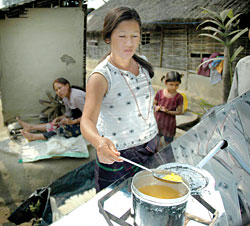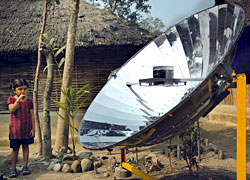|
|
It is the blazing light of the sun reflected off dozens of parabolic solar cookers outside the bamboo and thatch huts of Bhutani refugees, many of whom are spending their 16th year away from their home country.
The families come in shifts to change the pots on the cookers and it takes up to 30 minutes to boil rice for a family of four. There are some 110,000 Bhutani refugees in seven camps in Jhapa and their demand for firewood for cooking was seriously dwindling the surrounding forests. So in 1998, the Dutch-supported group, Vajra Foundation, decided to introduce solar cookers to reduce the pressure on the forests.
Ram Kaji Poudel of Vajra explains: "We thought we'd start from the refugee camps as people there have the time and patience to wait for food to be cooked and we wanted to prevent deforestation. When we complete the camps, we want to encourage Nepali communities outside as well."
 The Foundation has already distributed 550 cookers in Beldangi-I and plans to have 7,300 more set up in the other six camps by December 2007. Four families now share one cooker, which also includes a Hay-box-wooden or bamboo containers insulated with cotton or rice husk for insulation-for storing food to eat after the sun goes down. Vajra plans to cut that number to only two families per set.
The Foundation has already distributed 550 cookers in Beldangi-I and plans to have 7,300 more set up in the other six camps by December 2007. Four families now share one cooker, which also includes a Hay-box-wooden or bamboo containers insulated with cotton or rice husk for insulation-for storing food to eat after the sun goes down. Vajra plans to cut that number to only two families per set. As donor fatigue sets in, refugees have had to do with less and less. They say the UNHCR's cut in kerosene quotas is causing problems and they are thankful that at least they have the cookers. From 1 January 2006 the refugee agency replaced kerosene with bio-briquettes for cooking but it still provides one litre of kerosene to each family every month for lighting. C I Thapa has been living in Beldangi-I for 15 years and says: "People are getting panicky and it is getting tough to survive. The kerosene is being cut and briquettes don't work as well."
Even so, refugees are reluctant to sing the praises of solar cookers because they don't want relief agencies to use this as an excuse to make further cuts. "They don't want to openly admit how effective these cookers are," says Vajra's Poudel, "but they should rest assured because our project is different from UNHCR's."
The time required to prepare various foods with solar cookers on a sunny day in October:
|
As the memory of their homesteads and farms in Bhutan slips away, the Bhutani refugees here say at least the cookers have kept a ray of hope alive.
Vajra Foundation: PO Box: 10392 Kathmandu Nepal, 5572410, vajranepal@wlink.com



